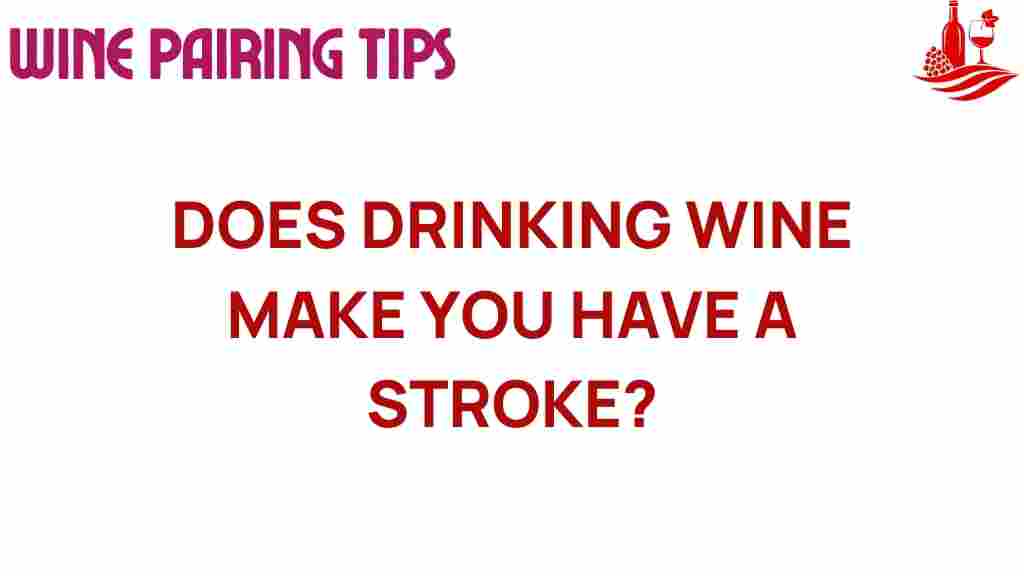Unraveling the Link: Does Drinking Wine Increase Stroke Risk?
For centuries, wine has been a staple of social gatherings and celebrations, often touted for its potential health benefits. However, recent discussions have raised important questions regarding its impact on stroke risk. As we delve deeper into the relationship between wine consumption and stroke risk, we will explore the health effects of alcohol consumption, particularly wine, on heart health and overall wellness. This article aims to provide a comprehensive understanding based on the latest research findings, emphasizing the importance of moderation and informed lifestyle choices.
The Connection Between Wine and Stroke Risk
The relationship between wine and stroke risk is complex and often contradictory. While some studies suggest that moderate wine consumption may have protective effects on heart health, other research indicates that excessive alcohol intake can significantly increase the risk of stroke. Here’s a breakdown of the critical factors involved:
- Moderate Consumption: Moderate wine consumption, particularly red wine, has been linked to various health benefits, including improved heart health and reduced risk of cardiovascular diseases.
- Excessive Drinking: Conversely, heavy alcohol consumption can lead to high blood pressure, atrial fibrillation, and other risk factors associated with stroke.
- Type of Wine: The type of wine consumed may also play a role. Red wine, for instance, contains antioxidants like resveratrol, which may offer protective benefits.
The Health Effects of Wine on Stroke Risk
Understanding the health effects of wine requires a closer look at how it interacts with various bodily systems. Here are some key points to consider:
- Heart Health: Moderate wine consumption has been associated with improved heart health. It can increase levels of high-density lipoprotein (HDL) cholesterol and has anti-inflammatory properties.
- Blood Pressure: While moderate drinking may help reduce blood pressure in some individuals, excessive consumption can lead to hypertension, which is a significant risk factor for stroke.
- Stroke Types: Different types of stroke (ischemic and hemorrhagic) may be influenced differently by alcohol consumption. Research suggests that moderate consumption may lower the risk of ischemic strokes, while heavy drinking may increase the risk of hemorrhagic strokes.
Research Findings on Wine and Stroke Risk
Numerous medical studies have been conducted to assess the connection between wine consumption and stroke risk. Here are some notable findings:
- Moderate Drinkers: A study published in the journal Circulation found that individuals who consumed one to two glasses of wine per day had a lower risk of stroke compared to non-drinkers.
- Heavy Drinkers: Conversely, a meta-analysis revealed that individuals who consumed more than three drinks per day had a significantly increased risk of stroke.
- Resveratrol Benefits: Another study highlighted the potential benefits of resveratrol, a compound found in red wine, which may contribute to cardiovascular health and reduce inflammation.
Moderation is Key
When it comes to alcohol consumption, moderation is crucial. The general guidelines for moderate drinking are:
- Up to one drink per day for women.
- Up to two drinks per day for men.
It’s essential to remember that what constitutes a “drink” can vary, but typically:
- One glass of wine is considered to be about 5 ounces.
- One standard drink contains roughly 14 grams of pure alcohol.
Exceeding these amounts can lead to adverse health effects, including increased stroke risk. Therefore, individuals should consider their unique health circumstances and consult healthcare professionals regarding their alcohol consumption.
Lifestyle Choices and Wellness
In addition to moderation in alcohol consumption, other lifestyle choices play a vital role in managing stroke risk. Here are some essential tips for maintaining overall wellness:
- Healthy Diet: A balanced diet rich in fruits, vegetables, whole grains, and healthy fats can support heart health.
- Regular Exercise: Engaging in regular physical activity helps maintain a healthy weight and lower blood pressure.
- Stress Management: High stress levels can contribute to hypertension and other health issues. Incorporating relaxation techniques can be beneficial.
- Regular Health Check-ups: Regular visits to healthcare professionals allow for monitoring of blood pressure, cholesterol levels, and other risk factors.
Troubleshooting Tips for Alcohol Consumption
If you’re concerned about your alcohol consumption and its potential impact on your health, consider the following troubleshooting tips:
- Track Your Intake: Keep a journal of your alcohol consumption to identify patterns and triggers.
- Set Limits: Establish clear limits for how much you plan to drink and stick to them.
- Choose Alcohol-Free Days: Designate certain days of the week as alcohol-free to reduce overall consumption.
- Find Alternatives: Explore non-alcoholic beverages that can be enjoyed socially without the effects of alcohol.
Conclusion
Understanding the relationship between wine and stroke risk is essential for making informed health choices. While moderate consumption of wine may offer certain health benefits, excessive drinking poses significant risks, including increased chances of stroke. By focusing on moderation and integrating healthy lifestyle choices, individuals can better manage their overall wellness and reduce potential health risks.
As you navigate your drinking habits, consider consulting with healthcare professionals to tailor a plan that best suits your needs. Remember, your heart health is a crucial component of your overall well-being, and informed choices about alcohol consumption are key to protecting it.
For further reading on heart health and lifestyle choices, check out this informative article on Heart.org.
This article is in the category Tips and created by Wine Pairing Tips Team
